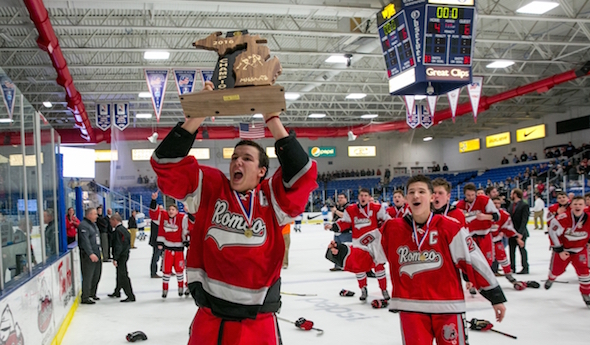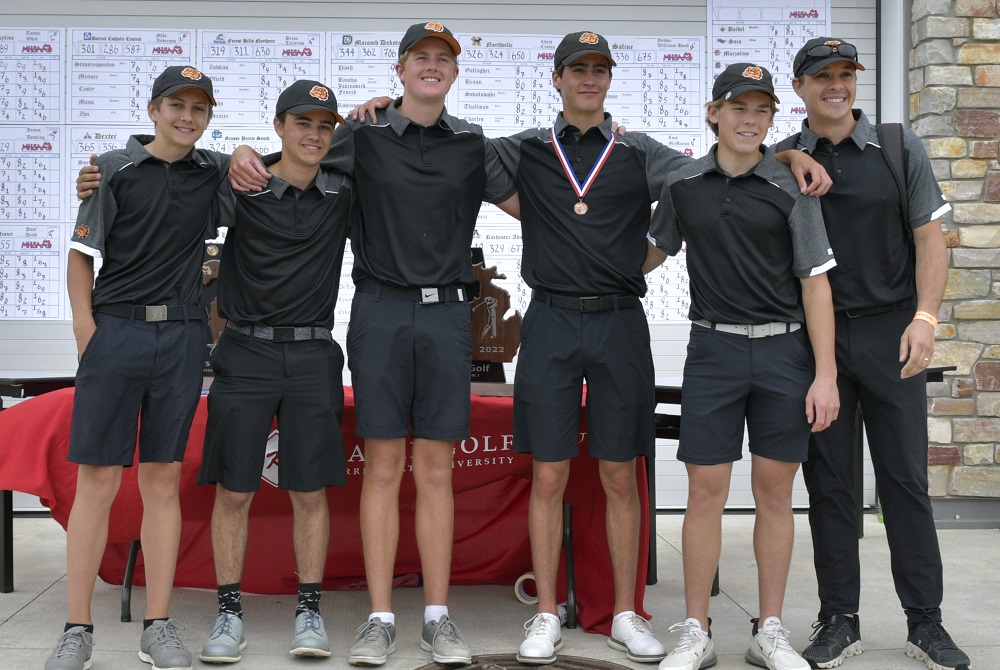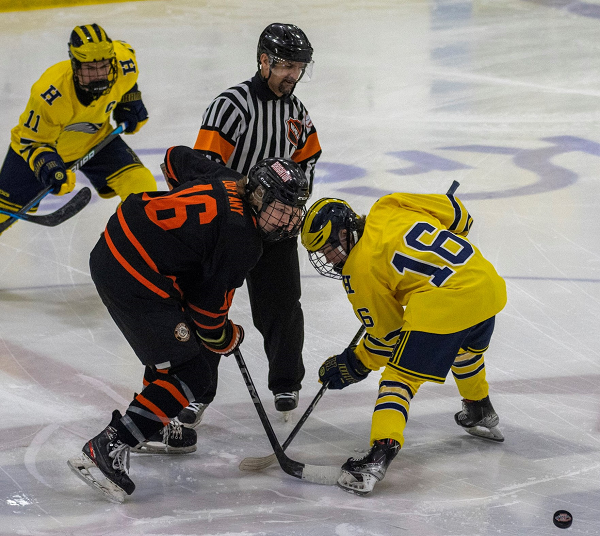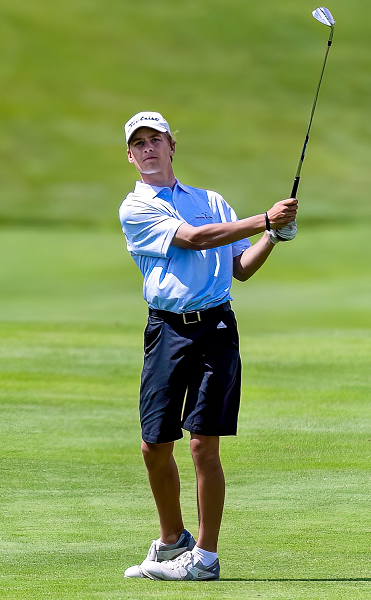
Hockey Team Becomes Romeo's Next Champ
March 12, 2016
By Bill Khan
Special for Second Half
PLYMOUTH — The students in the large Romeo cheering section might have been nervous.
Some of his teammates might have been getting nervous too.
Nolan Kare, however, couldn't allow himself to give in to the natural human reaction as the MHSAA Division 2 hockey championship appeared to be slipping away from the Bulldogs' grasp.
After scoring three straight goals during a frantic 5:02 stretch of the second period, a seasoned Livonia Stevenson squad held a 4-2 lead over a Romeo team that had never played on the biggest stage in Michigan high school hockey.
Kare stopped the last 11 shots he faced over the final 22 minutes and 21 seconds, backstopping Romeo to a 6-4 come-from-behind victory over Stevenson on Saturday at USA Hockey Arena.
"I know we kind of let up a little bit, but our team has so much heart," Kare said. "I know that if I just make the saves I'm supposed to make and try to rob a few that our team is going to give us the best chance to win. I know if I'm doing that, then I'm going to give them the best opportunity to put us in a position to get back."
Senior star Logan Jenuwine's tip-in goal during a five-minute power play with 10:21 left in the game snapped a 4-4 tie. Steven Morris scored an empty-net goal with 29.1 seconds left to seal the first MHSAA hockey title in the 15-year history of the Romeo program.
Suddenly, a school that had no MHSAA team championships going into the 2014-15 school year has three over the past 16 months. It began with the volleyball team winning the 2014 Class A championship and continued when the football team upset Detroit Cass Tech in the 2015 Division 1 title game at Ford Field.
"Before the game, we were saying if the football team could beat Cass Tech with 20 Division I (college) players coming up, we could beat Livonia Stevenson," Romeo senior forward Nick Blankenburg said. "Shocking the world and being part of such a great team feels incredible. To win a state championship for our school, to get those rings like our football team and volleyball team, I'll remember this my entire life."
Like the football and volleyball teams, the hockey team benefitted from a huge outpouring of support in a matchup that was witnessed by two passionate and energized fan bases.
"There's just something special about Romeo," said Kare, who finished with 29 saves and led the state with all 27 of Romeo's victories. "It's a small-town feel. You could see it out there. The entire town's out there for us. Just like football, just like volleyball, we had the whole community behind our back. We're just unbelievably blessed to have the best fan base, the best family, the best support out of anybody."
The atmosphere in which the Romeo and Stevenson players competed is one of the things that sets high school hockey apart from its competitors. Senior forward Ben Kowalske, who played in three MHSAA Finals for the Spartans, said neighbors will stop him and congratulate him on how the team is performing. Kowalske is the lone holdover from Stevenson's 2013 MHSAA Division 2 championship team and is a member of the MHSAA's Student Advisory Council.
"Being on the Council, you learn ideas and what other schools do," Kowalske said. "It's really amazing people are so interested in what we're doing. To have everyone come out to the game really means the world and really means a lot to us that we're doing something right here. You saw Romeo, too. They had the city support. It's cool. You try not to let it distract you during the game, but now that it's over, it's cool. It wasn't the outcome we wanted, but we did the best we could. It's really cool the community could come together over something and just forget about the world for a couple hours and just have fun."
 A defensive battle that was tied 1-1 for the first 23 minutes changed in a hurry as the second period neared its midway point.
A defensive battle that was tied 1-1 for the first 23 minutes changed in a hurry as the second period neared its midway point.
Romeo (27-2-1) grabbed a 2-1 lead at 6:18 of the second period on a goal by Jenuwine, but that only served to wake up the Spartans.
As Jenuwine's goal was being announced, Nick Beers scored the equalizer for the Spartans just 19 seconds later. Stevenson took its first lead 44 seconds later on a goal by Shane Leonard. Riding the crest of that momentum, the Spartans built their lead to 4-2 at the 11:39 mark on a goal by Nate Sudek.
With the game possibly slipping away, Romeo coach Nick Badder called what proved to be a critical timeout.
"We were down, they had all the momentum," Badder said. "I was telling (Adam) Krefski and the other assistants, 'Right now, they have all the momentum. We're on our heels, and we felt it. We calmed down the boys. Once they calmed down and realized it was shift by shift, we kind of took over."
Romeo got right back into the game before the second period ended, getting within 4-3 on Brett Lanski's second goal of the game with 2:34 left in the period and tying it when Luke Kaczor tipped in a shot from the point by Logan Ganfield with 1:30 to go in the period. Between the teams, six goals were scored during a 9:13 span.
Romeo was presented with a golden opportunity to break the tie when a Stevenson player received a five-minute major and game disqualification at 4:38 of the third period.
A power play that featured the highest-scoring player in the state wasn't going to miss over the course of five minutes. Jenuwine, who had 46 goals and 50 assists this season, scored what proved to be the game-winner at the 5:39 mark when he redirected a shot from the right point by Ganfield.
"It was going wide," said Jenuwine, who had two goals and three assists. "That's what I've been trying to work on mostly is get to the front of the net. I'm not really a guy to get to the front of the net; I did. It was a good shot by Logan Ganfield, and I got a tip on it."
Stevenson coach David Mitchell didn't blame the penalty for the loss.
"To say it turned there, it turned because they capitalized," Mitchell said. "They still had to capitalize, so you give them credit for capitalizing. We still had multiple chances to score and they had multiple chances to score. As a coach, it's so tough to explain to a bunch of 15-, 16-, 17-year-old kids that it's not one moment, it's an entire game. There were 51 minutes that were played out there where multiple other things happened."
Stevenson (22-7-1) had three offensive-zone face-offs in the final 1:25, but couldn't generate a scoring threat.
There might have been another had Morris' shot from inside his own blue line missed the target, but he found the center of the net for the game-clinching empty-netter with 29.1 seconds to go. For good measure, Morris blocked a shot in the final seconds.
Before Saturday, the Bulldogs' only playoff run beyond the Regionals came last season when they lost 8-2 to Grosse Pointe South in the MHSAA Quarterfinals.
"Last year's loss in the playoffs hurt," Badder said. "Grosse Pointe South took it to us; they kind of owned us. We didn't have a playoff game plan; we didn't have a playoff style last year. This year, I was so hard on these guys. We lost two games, and I was still, 'Guys, we're not doing this right, we're not doing that right.' They're like, 'Coach, we just won 6-1.' I was trying to get a point across to them that you've got to be a playoff team. You have to hit. You've got to block shots. You've got to get the puck in your own end. It's not the high-flying (Blankenburg) and (Jenuwine) show. We're a team, and the team will win in the end."
PHOTOS: (Top) Romeo players raise their first MHSAA championship trophy to the crowd after Saturday’s Division 2 Final. (Middle) Romeo’s Steven Morris (36) and Stevenson’s Sam Judd work to gain possession of the puck. (Click for more from Andrew Knapik.)

Hockey Players Transferring Winter Puck Skills to Spring Golf Swings
By
Tom Lang
Special for MHSAA.com
May 26, 2023
When the Michigan seasons shift from winter to spring, some high school golf teams are a little more eager than others for the hockey season to officially end.
This is especially true for the school golf programs in Brighton, Hartland and Muskegon Mona Shores – examples of boys teams that love having hockey players transition from the indoor frozen ice to play golf outdoors on the lush green grass.
“I would take a golf team full of hockey players any day,” said Hartland golf coach Nathan Oake. “I love them.”
We can tell, because his program is full of them.
Hartland and Brighton each have eight hockey players on their 16-golfer varsity and JV rosters.
Mona Shores has three hockey players this year, but usually has more. In 2023 it’s Oliver MacDonald (all-state honorable mention in hockey), Nathan McNarland and Nicholas Taylor, who was voted Division 1 all-state golf last spring, then leading his team to fifth place at the MHSAA Lower Peninsula Division 1 Final.
 Brighton golfer Winston Lerch was also Division 1 all-state last year in golf and an assistant captain on the hockey team this winter that finished Division 1 runner-up to Detroit Catholic Central. Here in 2023, he shot a 65 to open the season at Oakland University for medalist and has committed to Grand Valley State for golf with his 72-stroke average.
Brighton golfer Winston Lerch was also Division 1 all-state last year in golf and an assistant captain on the hockey team this winter that finished Division 1 runner-up to Detroit Catholic Central. Here in 2023, he shot a 65 to open the season at Oakland University for medalist and has committed to Grand Valley State for golf with his 72-stroke average.
Joining Lerch in the Bulldogs boys golf program are hockey players like Levi Pennala, winner of hockey’s Wall Award sponsored by State Champs as the top high school goalie. Pennala – who recently shot 72 at the Kensington Lakes Activities Association championship tournament, his career low for high school golf – finished in the top 30 last year at the LPD1 Final. Then early this spring when he was away at a high-level junior hockey tournament, freshman hockey player Adam Forcier stepped in and shot a school record 18-hole round for a freshman at 73. Jacob Daavetilla also works into the starting lineup at times.
Forcier tied the record of Davis Codd – who, as a pro hockey player on leave from the Saginaw Spirit OHL hockey team when COVID-19 shut down the league, won the LPD1 Final in 2021 for Brighton.
Brighton golf coach Jimmy Dewling said Codd was one of the earliest to prove to others you can play both hockey and golf and excel. In fact, that June in 2021, Codd went to an NHL scouting camp in Pennsylvania before the Golf Finals, drove overnight back to Forest Akers to play the two championship rounds, won the title, then immediately returned to Pennsylvania to resume the hockey camp.
“On our team, we believe, and TBone (Codd) was a perfect example of it, if there’s any time you have the opportunity to be competitive, it is going to make you a more well-rounded competitor and therefore better at your particular sport,” Dewling said.
“We like hockey players. In the winter, they have to think to where the puck is going, be smart enough to react, and understand how that emotion is going to carry over from one play to the next. When it’s your shift you have to forget about the last shift, or take something from the last shift and put it into the next shift, to have consistent play.
“It’s the same on the golf course,” Dewling continued. “It’s one hole to the next, one shot at a time, being tough, and that’s only going to come from competition reps. We love the athletic ability more so than anything; the toughness and competitiveness all year.”
In addition to Lerch and Pennala starting on varsity golf, they are joined by traditional golfers Matt Doyle, Riley Morton and Andrew Daily, who is committed to Wayne State and finished LPD1 runner-up last spring.
 Going into the 2023 golf postseason, Brighton is ranked No. 2 in Division 1. The Bulldogs have won the Next Tee Invite at Oakland Hills, the North Star Invite at Plum Hollow and the KLAA Conference Championship – earning Brighton’s first conference title since 2007. The Bulldogs also were runners-up at The Meadows Invite at Grand Valley State University. The team is averaging 297 for 18 holes.
Going into the 2023 golf postseason, Brighton is ranked No. 2 in Division 1. The Bulldogs have won the Next Tee Invite at Oakland Hills, the North Star Invite at Plum Hollow and the KLAA Conference Championship – earning Brighton’s first conference title since 2007. The Bulldogs also were runners-up at The Meadows Invite at Grand Valley State University. The team is averaging 297 for 18 holes.
Oake admitted this is a rebuilding year for Hartland’s golf program. The varsity lineup has only two returning players with varsity golf experience – Keller King and Brady Betteley.
“So, we opted to keep a group of tough competitors with a solid combination of speed and strength – and who are not concerned about the cold conditions that we play in,” Oake quipped.
Five others rotate into the Eagles’ golf starting lineup with King and Betteley: Isaac Frantti is an all-state hockey defensemen playing his first season of golf but shot a career-low 79 at American Dunes recently. He just signed a United State Premier Hockey League tender to play in Connecticut next year. Ian Kastamo scored the winning goal in Hartland’s Division 2 hockey championship victory in 2022, and LJ Sabala is a varsity hockey player as well.
Then there are two non-hockey freshmen getting shots to start occasionally – Dallas Korponic, who finished third at his weight at the Individual Wrestling Finals, and Michael Maurin. Five more sophomores and juniors are hockey players on the JV golf team.
“We hope to be competitive with (Brighton) again soon, but they have the talent to make a big splash this year,” Oake said. “I also play golf at the same club as many Brighton players, so I see them quite a bit and we are friendly. When the Brighton team walked by our team on a recent Monday and all said hello to me and our guys, one of my players looked at me and said that this was the biggest difference between hockey and golf. In hockey, the small talk would be (traded) for the ice, and it would not be very nice out there.
“Either way, I believe both sports are filled with fierce competitors and respect, but when the game is over a handshake and a golf hat tip are offered to the victor.”
This story was updated and reposted with permission of MIGolfJournal.com.
PHOTOS (Top) Brighton takes a team photo after finishing third at last season’s LPD1 Final, and all five golfers are back this season including hockey players Levi Pennala (second from left) and Winston Lerch (second from right.) (Middle) Hartland’s Ian Kastamo (16) takes a faceoff against Brighton this winter. (Below) Mona Shores’ Nicholas Taylor fires an iron shot. (Photos courtesy of High School Sports Scene, Sapshots Photography and Mona Shores’ athletic department, respectively.)

